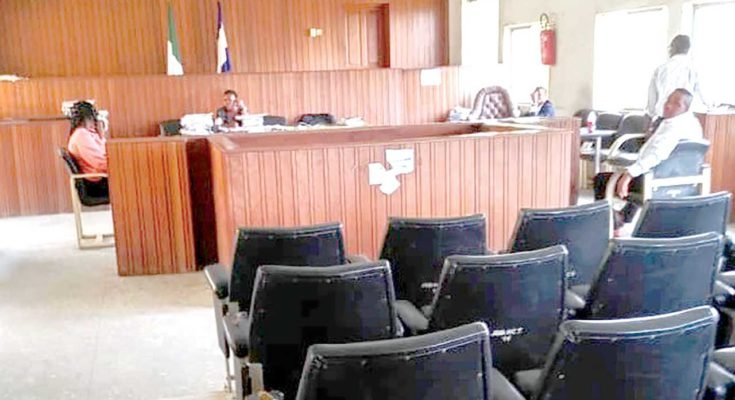I have been married to a lawyer for over a decade, yet I have never had an opportunity to witness a court session. Beyond marriage, I can boast of a substantial number of close friends and family members who belong to the legal profession. Following an obscure impulse, I have always subconsciously avoided their place of work. This phobia has to do with childhood perceptions of fear, mistrust and perhaps contempt (because I was told they defended criminals). However, by sheer twist of irony, it was my destiny to find my soul mate in the household of a renowned criminal-law lawyer!
Recently, our home was burgled while the whole family slept. The burglar even violated my bedroom, from where he made away with several items of value. Coincidentally and consolingly, a friend of mine and a Senior Advocate of Nigeria who lives in the same neighbourhood, had a similar experience a fortnight earlier. Unlike him, we were luckier because the thief had left some implicating clues to his trail, at the scene of crime. After 10 days of fruitless investigations, the police turned to the law courts for assistance, reprieve or whatever.
By reason of jurisdiction, I was informed by my wife that our case would be heard at the Magistrate Court. I was further advised of the time (9am) as well as attendance requirements. It was specifically mandatory that my cell phone be powered down, while inside the court room. What an inconsiderate regulation! How would I take my emergency calls? She also teased that I might be “charged for contempt” if I forgot to bow on entry or exit. What an idolatrous tradition! This warning, masked in a joke, instantly rekindled my childhood dislike for the courts. I recall that I even asked if there was also a dress code, though in pretended mockery.
I hastily ran through my morning rituals and arrived at the court premises by 9.10am, with all the apprehension of a late comer. But amazingly, I saw people (lawyers, clients and staff) clustered in groups and chatting noisily in the parking area. From time to time they would half-heartedly glance towards the court entrances for any signs of activity.
At about 10.15am, we were signalled towards the door. As we filed into the room in respectful silence, I was unsure of what to expect. First, I was struck by the glaring shabbiness of the interior. There was dust everywhere. The walls were defaced by cobwebs and in desperate need of painting. The floor was bare and rough, a clear evidence of age and neglect. The ceiling, which might have worn a white paint sometime in the past, was now brown with dust and dirt. It was dotted with 6 empty lamp-holders and 4 outdated ceiling fans, whose rusting blades had somewhat become discoloured after years of disuse and disrepair. I could not even locate the controls. It was therefore a pleasant surprise when one of them suddenly creaked into life, as power was restored a few minutes later.
The lay gallery was located at the rear and consisted of about 6 wooden benches. They were so closely clustered that there was little leg-room for the occupants. Further towards the front, the benches assumed a different design. They were bigger and more concealing with longer backrests, much like bar stools borrowed from a 16th century pub. The lawyers were seated here. Could this arrangement be the origin of their “bench and bar” tradition? All the sitting surfaces were covered with dust. Some people borrowed sheets of newsprint while others used handkerchiefs to address a common need: to save their clothing from early laundry! I was profoundly disappointed.
From my sitting position I sighted two metal boxes sticking out of the front wall. Could they be air conditioners? No, not likely in this colonial court house. But my first guess was right, as I observed more keenly. By crude estimate, these air conditioners were at least 30 years old. Expectedly, they were long out of function. But they served well to plug the holes in the wall! In the colonial era, this building might have been a model court house. But in this age, it was an architectural “dinosaur”.
In the interim, my attention was drawn to a conspicuous heap of incongruous objects, located at the left rear corner of the room: motor bikes (okada), old television sets, gas cookers, vulcanizing machines, obsolete type-writers and even tainted toilet bowls. All of them were enmeshed in dusty bands of cobwebs. There were other sundry items I could not identify through the underlying maze. I tried to make sense of their presence. But the mix was just as bewildering as the possible reasons for their custody. By now, I was thinking almost aloud. Motor bikes in a court room? Oh, they might be stolen items used as exhibits. But who would steal an old toilet bowl? And why were they not kept in a storage facility? Perhaps they were kept here to ensure they were not stolen a second time! But how secure is this archaic building? At this point, I began to yield to an old dust-allergy by sneezing and coughing. I was now distracting the learned people and probably constituting health hazard to my fellow “benchers”. Oh sorry, I meant fellow observers. “Benchers” are supposed to refer to the elevated members of the “bar”.
As I struggled with my thoughts, three crude bangs ushered in “His Worship”. Everybody stood in “worship” and acknowledged his priestly bow. I promptly remembered my wife’s earlier warning and quickly complied. I sure did not want to go to jail. If the court was this bad, the prison would be a house of horror! But why was this bowing tradition so important to lawyers? Perhaps the ancient churches also doubled as law courts. We all sat and the first case was announced.
In the beginning, I intended to restrict this writing to the distractions of the environment. But I must capture one intrusive, human encounter that almost disrupted court proceedings. He was diminutive, evidently well-schooled but apparently not well-groomed. In the middle of one session, this “learned” gentleman shuffled noisily into the court room clutching a pile of books, too heavy for his delicate frame. The other hand carried a time-worn, half-open attaché-case, filled with tattered documents. The books were awkwardly tied together with a faded, purple ribbon, much like a marriage of several warring partners. Soon after he settled with his load, his case was announced and he decidedly negotiated an adjournment. He then waddled out as clumsily and burdensomely as he had entered, without even the traditional courtesy of a bow. Yet, he was neither apprehended nor reprimanded. I became more confused. When I looked around, everybody wore a mischievous smile. I thought I heard someone remark that all the dramatics were put up to impress his illiterate clients!
Are these lawyers really as learned and urbane as they profess? Or is it all about theatrics, loud claims, heavy books and disorderly documents? My confusion and disappointment gradually gave way to doubts. I began to seriously wonder if any sound ruling could ever emerge from these dusty court rooms, after those hasty proceedings and amidst such rusty traditions….
I tried to recollect my first and only day in an American court room. One bright summer morning in Boston, my friend and I had been booked for a minor, though controversial, traffic offense. Since my friend was contesting the ticket, we were politely referred to a judge for further questioning. In retrospect, it would be clearly unfair and perhaps condescending to compare the two experiences. To do so would be like travelling to a distant planet, in another age….
As the court clerk announced that our case was next in line, I was rudely jolted back to the present. It was indeed a remarkable day.

Dr. Uzoma Amadi, Onitsha, Nigeria.
Email: uzomaamadi@yahoo.com (for constructive comments)
![]()



